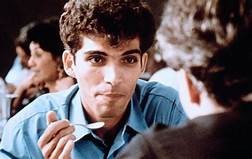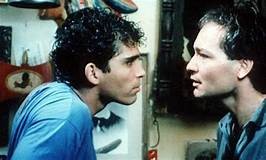tea, books, music—and sympathy
by Douglas Messerli
Senel Paz (screenplay, based on his story), Tomás
Gutiérrez
Alea and Juan Carlos
Tabío (directors) Fresa y
chocolate (Strawberry and Chocolate) / 1993
Despite its rather romantic comedy-like title,
Strawberry and Chocolate is a film with attempts to discuss what being
gay in the Cuba of the late 1970s meant in a more serious context.
Diego’s somewhat effeminate manner as he brazenly sits down with the boy
to order up strawberries—which he argues are the best thing that Cuba still
produces—as opposed to the chocolate which David is spooning, is definitely the
wrong approach to take in seducing this straight, slightly homophobic,
dedicated Communist university student.
Once he has gotten his Torvald into his lair of literary tomes, however,
and “accidently” spilled coffee on the boy enabling him to remove his shirt and
hang it from the balcony—a sign to German and his other gay friends that his
seduction has been a success—there is no turning back, despite David’s
increasing disdain of his host; upon discovering that Diego has no illicit
photos of him, he announces that he wants nothing more to do with the “fag.”
Diego, who along with his artist friend German is pretentiously
religious—he uses it more as an act of cultural rebellion one suspects that out
of true belief—prays to one of German’s religious sculptures that the boy will
be brought back to his flat. But it is not the gods who draw David back, but
curiosity, the books he has seen, and the music (such as Maria Callas singing
from Verdi’s Il Trovatore and “Adios a Cuba” by Ignacio Cervantes) and,
almost as importantly at first, the challenge by his roommate Miguel (Francisco
Gattorno) to spy on Diego, who as a gay, highly literate man who openly
disobeys political dictates, is automatically suspect.
Although Miguel is a stalwart Communist ideologue, writer Senel Paz and
directors Tomás Gutiérrez Alea and Juan Carlos Tabío also hint that Miguel is
possibly attracted to David as well and is curious about Diego not simply
because of his anti-political views but his sexuality. In a sense he sends
David to Diego both as a kind of buffer between himself and his desires but
also as a subtle “test.”
And so, the directors have created a kind of structural device that
works perfectly to bring these two very different people together—an innocent
boy (who incidentally has just been dumped by his female lover, Vivian [Marilyn
Solava] in order to marry an older and wealthy man) and an intellectual
mentor—creating a dialectic which is intended to explain contemporary Cuba
politically and culturally both.
Of course, to actually talk seriously
about these subjects might make for a terribly intellectual but equally
terribly boring story. What these two do both share is a love of Cuba, and
gradually, over their many comings and goings and agreements and arguments is a
love for one another, a love that necessarily transcends sex.
As critic Roger Ebert nicely put it, Strawberry and Chocolate “is
not a movie about the seduction of a body, but about the seduction of a mind.
It is more interested in politics than sex—unless you count sexual politics,
since to be homosexual in Cuba is to make an anti-authoritarian statement
whether you intend it or not.”
What we also discover is that Diego is just as much an idealogue for
free-thinking and open-mindedness as David is for the Party line. Fortunately,
they are changed by their encounters—Diego, since David demands that he use no
pet names or camp slang to describe him, dropping his clever repartees and some
of his artificially swishy gestures, while David slowly grows to admire how
bravely Diego stands up to a government that would like to wish him out of
existence.
Inevitably, Diego’s brave tactics get him into trouble both with his
friend German—who is willing to sell out by accepting an offer to show a few of
his works in Mexico as opposed to a full Cuban gallery presentation—and the
governmental authorities after he sends a letter of protest on behalf of their
refusal to show German’s art, which results in his inability to partake of any
employment except as a laborer.
David meanwhile comes under question for his quietude around his school
mates and outbursts of support for Diego when he comes under attack. He even
begins to bring flowers to the beloved friend with whom he will never have sex,
and rumors have arisen that he is having a homosexual affair with the man he
was supposed to be investigating.
As it becomes clear that Diego, like so many other Cubans who left their
country under duress, will have to immigrate if he is to survive, he attempts
to keep his departure secret, asking his neighbor Nancy (Mirta Ibarra), rumored
by neighbors to be a whore, to look after David and even introduce the still
virginal boy to the pleasures of sex—which for him may be the greatest
sacrifice of all.
The final scene wherein Diego, about to leave, breaks down and admits
his original plan to seduce David—admitting that he has himself unwittingly
helped put the boy in jeopardy by allowing the rumor that they were sexual
partners to prevail—seems a bit tacked on. We already know all this, as David
now must as well. Yet it allows Diego finally to admit that he couldn’t bring
himself to deny the rumor because of the deeper truth that he truly has fallen
in love with David; and it allows David finally to stand up and show his own
love, for the first time in the film fully touching Diego as he embraces him in
a deep hug. If this isn’t truly what queer love is all about, then I should
perhaps immediately stop the arduous task before me of seeing and sharing every
movie that represents LGBTQ lives and loves that I can.
One
of the very first of Cuban films to feature a gay character, Strawberry and
Chocolate won the Goya Award for the Best Spanish-Language Foreign Film, a
Sundance Film Festival Special Jury Prize, and the 44th Berlin
International Film Festival’s Silver Berlin Bear award and a Teddy (awarded to
films with LGBT topics). It was also nominated for Academy Award for Best
Foreign Film.
Los Angeles, January 24, 2021
Reprinted from My Queer Cinema blog and
World Cinema Review (January 2021).






No comments:
Post a Comment